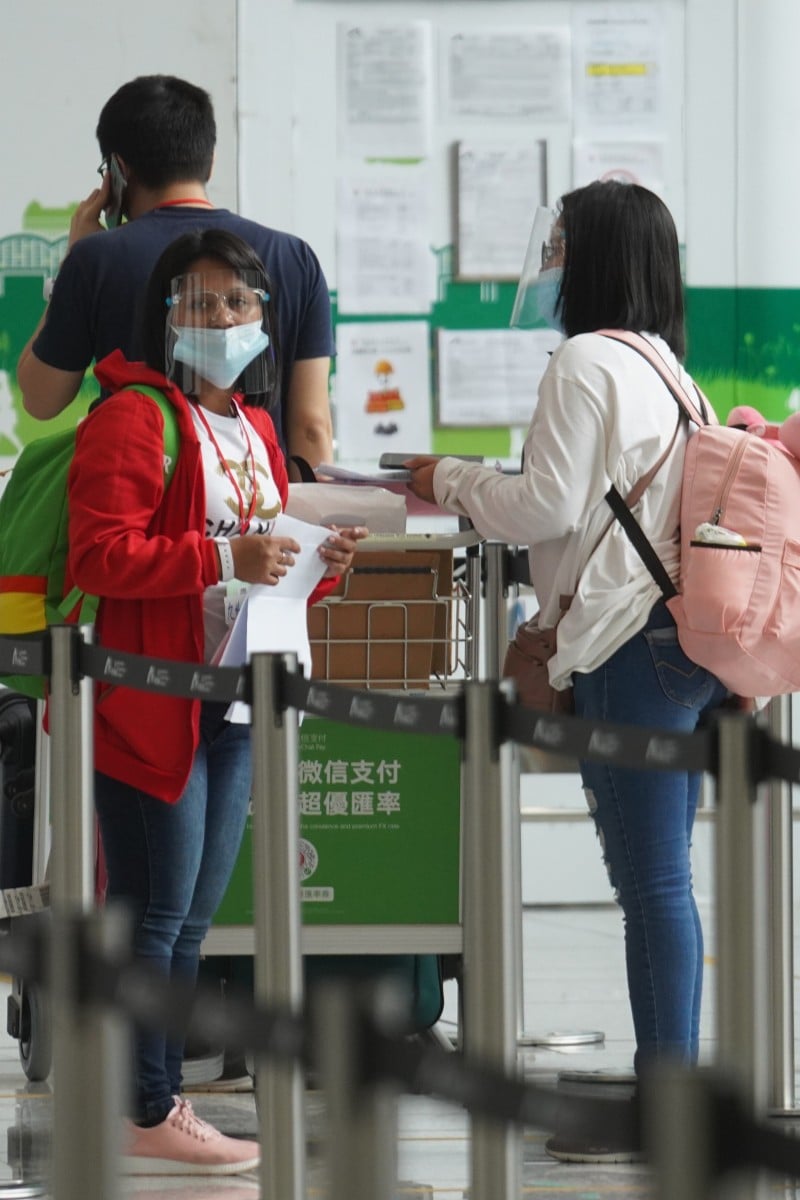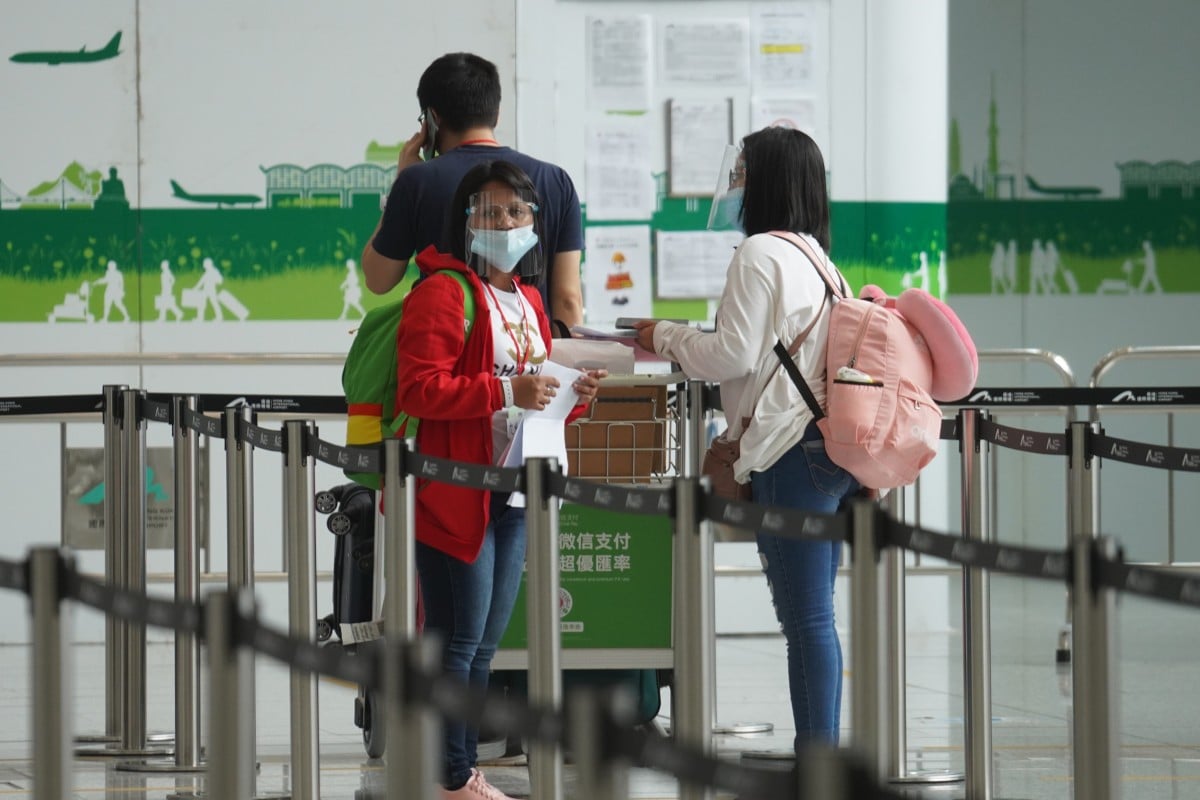
Coronavirus: Talks on easing Hong Kong’s Covid-19 flight ban to bring back residents, workers, Philippines diplomat says
- Consul general says authorities are looking to allow fully vaccinated Hong Kong residents and those with work visas to return from countries classified as extremely high-risk for Covid-19
- Employment agencies estimate that more than 5,000 domestic workers are stuck in the Philippines and Indonesia because of these travel restrictions
 Philippines consul general reveals that discussions were held last week on lifting the direct flight bans for the city’s residents and workers. Photo: SCMP/ Winson Wong
Philippines consul general reveals that discussions were held last week on lifting the direct flight bans for the city’s residents and workers. Photo: SCMP/ Winson WongFully vaccinated Hong Kong residents and those with work visas arriving from all countries subject to Covid-19 flight bans will be allowed into the city under the initial stage of an official plan to ease travel restrictions, according to the Philippines’ top diplomat locally.
Consul general Raly Tejada revealed on Monday that discussions were held last week between the Philippine consulate and city authorities on lifting the direct flight bans in place to guard against the coronavirus threat from overseas.
Hong Kong banned flights arriving from the Philippines and Indonesia in April and June, respectively. Both countries were classified as “extremely high risk” for the coronavirus, a category that also includes Britain and India.
Employment agencies estimate that more than 5,000 domestic helpers are stuck in the Philippines and Indonesia because of the measure. Desperate local employers, they added, were currently willing to offer salaries as high as HK$8,000 (US$1,030) a month – 73 per cent more than the minimum – to helpers already in the city.
Tejada told the Post that the consulate had asked Hong Kong officials to re-examine the Philippines’ classification to allow city residents and those with the right to work in the Asian finance hub to be allowed to return.
City authorities “recognised the need” for those people to return, Tejada said.
“Hong Kong initially plans to facilitate the return of vaccinated residents and workers from all countries currently under the ban,” he said.
“They were also careful to add that the plan is not final and details of the scheme still need to be thrashed out.”
Thomas Chan Tung-fung, chairman of the Hong Kong Union of Employment Agencies, welcomed such a move, saying: “It has been a big headache, not just for employers who want to hire foreign domestic workers, but also for agencies too.”
He estimated that about 20 per cent of the 5,000 helpers stuck in limbo had already received one dose of a Covid-19 vaccine, but less than 10 per cent were fully vaccinated.
While only a few hundred would be able to travel to Hong Kong at first, more would soon follow because the Philippines and Indonesia had recently begun prioritising such workers for vaccination, he said.
Chan said the travel restrictions had increased the demand for workers who were already in Hong Kong, with the average salary employers were willing to pay creeping up to HK$5,500 a month, 19 per cent more than the minimum wage of HK$4,630.
Employers with two or more children, or those who required elderly care, were prepared to pay HK$7,000 a month or more, he added.
She climbed Mount Everest; now she can’t come back to Hong Kong
Mike Cheung Chung-wai, president of the Overseas Employment Centre, said more than 300 domestic helpers registered with his company had been forced to delay their arrival.
“There’s just a supply and demand problem. We just currently do not have enough local domestic helpers who are already in Hong Kong. For a lot of families, it’s not that they’re unwilling to pay more, they’re just not able to hire one,” he said, adding that he knew of some families willing to fork over HK$8,000 per month for help.
“Especially for those whose job descriptions may not be attractive – they have several kids, or have no private room for the helper – their only hope is to get someone from abroad who is usually more willing to take these jobs. Without that lifeline, they’re simply unable to get a helper.”
Opinion: Hong Kong needs to do more to protect its domestic workers
Brazil, Britain, India, Nepal, Pakistan and South Africa are also on the list of “extremely high-risk” places. Passengers who have stayed in those countries for more than two hours in the past 21 days are barred from arriving in Hong Kong.
The Food and Health Bureau said the government would continue to closely monitor the state of the health crisis overseas, the prevalence of coronavirus variants, vaccination progress and changes in cross-border traffic.
Authorities would adjust the boarding and compulsory quarantine requirements accordingly, the department added.